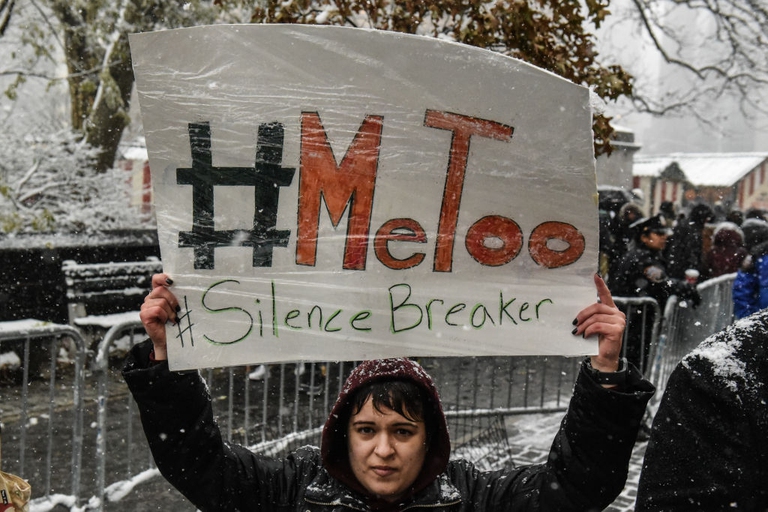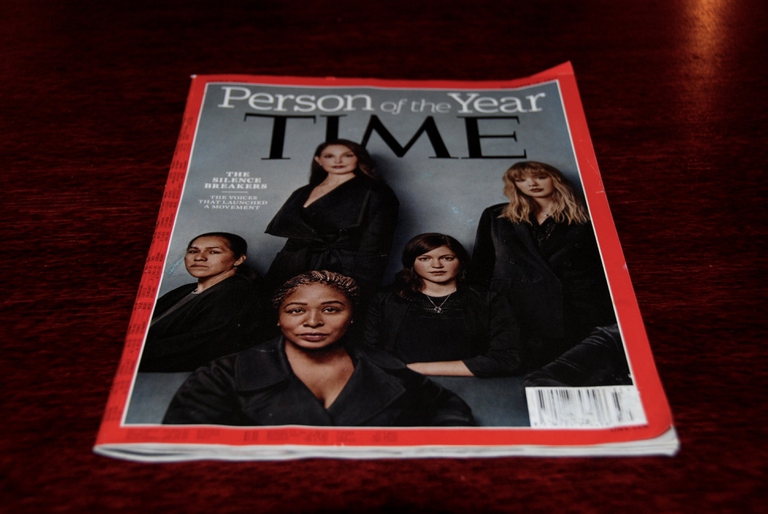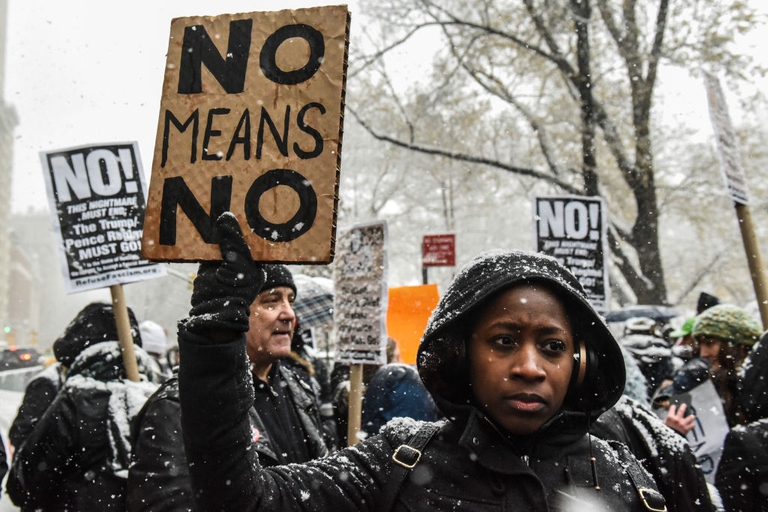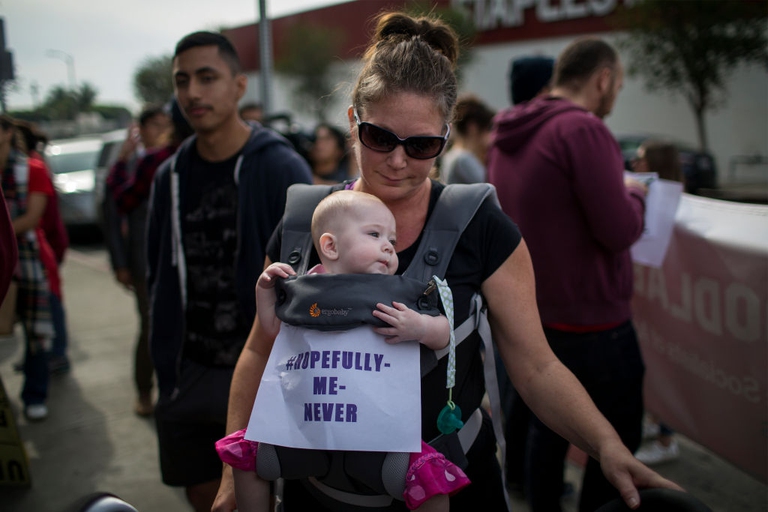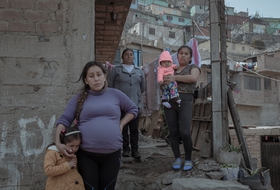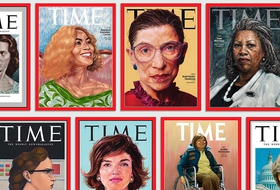
One in three women have suffered physical or sexual violence. With contributions from Europe, Africa, Asia and Latin America, we look at how this shadow pandemic affects every corner of the world.
The Time Person of the Year 2017 title goes to the online #MeToo movement that has encouraged millions to share their stories of sexual violence. The magazine highlights the stories of exceptional “silence breakers”.
After Angela Merkel in 2015, the first woman to be chosen since 1986, this year’s Time Person of the Year, title traditionally conferred by the US-based magazine to the person or people who according to it have most influenced the past 12 months, goes to the #MeToo campaign. Time featured mostly female “silence breakers“, that is individuals whose courage to speak out by telling their stories of being subjected to sexual harassment and violence (which disproportionately affect women) launched the movement. Another landmark moment in a significant year in the fight against gender disparity (for better and for worse), which among other things saw the Women’s March being held in Washington DC, the US capital, in response to Donald Trump’s inauguration, the widening of the global gender gap for the first time in a decade and the recently held International Day for the Elimination of Violence against Women.
The viral #MeToo hashtag emerged spontaneously in response to the widespread phenomenon of sexual violence: in fact, one in three women suffer some form of physical, sexual, or psychological violence in their lifetime according to the United Nations, but this grim statistic is exceedingly downplayed. Consequently, crimes are frequently unreported due to fear of retaliation. The issue came under the media spotlight especially as a result of the high-profile investigation into the inappropriate sexual and misogynist behaviour – which may also have been illicit, as police investigations are set to determine – of Hollywood mogul Harvey Weinstein over the course of his decades-long career.
#MeToo was first popularised by activist and actress Alyssa Milano, who spoke out encouraging women to also come forward on social media. “If you’ve been sexually harassed or assaulted, write ‘me too’ as a reply to this tweet,” she posted on Twitter in October. When she checked her phone the next day she had already received over 30,000 replies. Millions more have come forward ever since.
Read more: The global gender gap, the 2017 report shows that disparity has increased for the first time in a decade
If you’ve been sexually harassed or assaulted write ‘me too’ as a reply to this tweet. pic.twitter.com/k2oeCiUf9n
— Alyssa Milano (@Alyssa_Milano) 15 ottobre 2017
“I was afraid. When the man was harassing me, he threatened to harm my children and me – that’s why I kept quiet,” says Isabel Pascual, a fruit picker of Mexican origin and one of the silence breakers recognised by Time for the groundbreaking repercussions of their bravery to tell their story, featured on the magazine cover together with actress Ashley Judd, software engineer Susan Fowler, corporate lobbyist Adama Iwu and musician Taylor Swift. “I felt desperate, I cried and cried. But, thank God, my friends in the fields support me. So I said, ‘Enough’. I lost the fear. It doesn’t matter if they criticise me. I can support other people who are going through the same thing”. Pascual, whose name was changed to protect her family, spoke out about harassment in the agricultural sector during a march held in Los Angeles, empowering others to confront their perpetrators.
“For giving voice to open secrets, for moving whisper networks onto social networks, for pushing us all to stop accepting the unacceptable, the Silence Breakers are the 2017 Person of the Year”, these the words used by Time magazine explaining its choice. These people have “unleashed one of the highest-velocity shifts in our culture since the 1960s”: “We are in the middle of the beginning of this upheaval. There is so much that we still don’t know about its ultimate impact. How far-reaching will it be?”, its editors ask.
Along with the Person of the Year announcement, Time also publishes the list of candidates shortlisted for the title. This year’s list included, among others, controversial leaders of the United States and North Korea Donald Trump and Kim Jong-Un; those eligible for temporary protection in the US under DACA legislation, instituted by former president Barack Obama and dismantled by the current administration, that is the children of undocumented immigrants known as the “Dreamers”; and American football player Colin Kaepernick, who inspired the #TakeAKnee protest against racism and police brutality.
Read more: #TakeAKnee, football players kneel against discrimination in the US
By celebrating #MeToo, Time has recognised the gravity of sexual violence in the United States and in all our societies and the need to continue denouncing its perpetrators. Looking at this phenomenon through the magnifying glass isn’t enough, though. For now, the powerful #MeToo revolution remains “more like a promise than a certainty,” the magazine concedes. It will be up to all of us to determine what kind of order will arise from beneath the multilayered rubble of humiliations and violence endured in silence for centuries.
Siamo anche su WhatsApp. Segui il canale ufficiale LifeGate per restare aggiornata, aggiornato sulle ultime notizie e sulle nostre attività.
![]()
Quest'opera è distribuita con Licenza Creative Commons Attribuzione - Non commerciale - Non opere derivate 4.0 Internazionale.
One in three women have suffered physical or sexual violence. With contributions from Europe, Africa, Asia and Latin America, we look at how this shadow pandemic affects every corner of the world.
The Istanbul Convention against gender-based and domestic violence marks its tenth anniversary. We look at what it is, who its signatories are, and what the future might hold.
European Commission President Ursula von der Leyen reminded us of the gravity of violence against women around the world, and of the Istanbul Convention’s utmost importance.
President Erdoğan has pulled Turkey out of the Istanbul Convention, key in the fight against gender violence, claiming that it favours the LGBT community rather than family values.
Violence against women in Peru has increased as a result of Covid-19 lockdowns. 14,912 people were reported missing from January to November 2020, more than half of them minors and 64 per cent women. People have been confined to their homes for months, many forced to endure poor physical, economic and social conditions. A situation that
Joys Estefani Qqueccaño Huamani, 24, disappeared from her rural community in Peru on 9 October. Her family began looking for her independently of the authorities and despite the resistance of relatives of Joys Estefani’s ex-partner Arturo Ccana Condori, 32, charged with committing violence against her on 28 September, eleven days before Joys Estefani disappeared. Photos
Costa Rica celebrated its first same-sex marriage when two women, Alexandra Quiros and Dunia Araya, celebrated their wedding: an “extraordinary moment”.
The pandemic and its restrictions are affecting everyone, without exceptions. However factors like housing, income inequalities, gender, access to technology and working conditions are influencing how people experience the health crisis.
Time magazine’s 100 Women of the Year project sheds light on influential women’s stories, from Amelia Earhart to Greta Thunberg. A selection of some of the greats for International Women’s Day.
